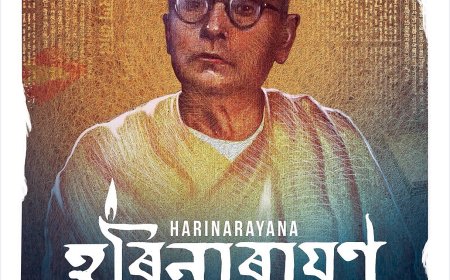Review : Only to You, I Surrender (2025)

Aditya Raj’s Only to You, I Surrender, a 29-minute Tulu short, is a rigorous exploration of how belief intertwines with power. At its centre is Shivarama, a wealthy landowner whose reputation as a devout man conceals a ruthless sense of entitlement. When a child steals areca nuts from his plantation, he interprets the act not as petty theft but as a blow to his prestige. His decision to consult an astrologer to catch the culprit reveals how readily piety can be weaponised to mask cruelty, even as desperation pushes the vulnerable into transgression.
The film’s formal choices sharpen this critique. Shivarama’s conversations with his wife and his friend Prakasha are left off-screen. The camera instead rests on the textures of everyday life, and the very people and spaces implicated by his words. This tactic forces us to connect what is said with what is lived, underlining the disjunction between pronouncement and reality. Elsewhere, the juxtaposition of children’s innocence, tinged with guilt when caught out, with the brazen evasions of adults suggests how moral instinct erodes under social hierarchy.
What emerges is not a simple opposition between good and evil, but a moral dilemma that is deliberately left unresolved. Beethura, the house-help, denied her daily wages for several days, embodying the quiet violence of exploitation. If theft becomes the only recourse for the socially powerless, the film does not condone it; rather, it compels us to confront the conditions that make it inevitable. The caste dimension is never overstated, yet it is unmistakably inscribed into the narrative. Shivarama’s authority rests not only on wealth but also on his position as an upper-caste individual, while Beethura’s voice is reduced to pleading. The film draws us into a moral terrain where we must ask whether allegiance—divine or human—can ever lie with the oppressor. The opening scene, with Shivarama chanting mantras to Lord Vishnu, later exposes his hypocrisy with devastating clarity. Raj’s pacing is stately, the construction measured, but the patterning never feels schematic. Instead, it builds toward a haunting question that lingers beyond the film: when rituals conceal cruelty and desperation drives the powerless to transgression, whose side does divinity truly favour?
Nikhil R. Shetty’s cinematography captures the rain-washed village with an unforced naturalism, contrasting the sombre interiors of Shivarama’s household with the sparse domestic space of Beethura. These visual distinctions reinforce the asymmetry of their lives without lapsing into overstatement. Aditya Raj’s editing imparts a seamless rhythm, allowing the film’s measured pace to accumulate weight rather than slackness. Equally striking is Naveen Rai’s sound design, which utilises the textures of rainfall, silence, and ritual chanting to expand the atmosphere beyond what is visible.
The casting of non-professional actors proves judicious. Shivarama, Beethura, and the child Udbhav inhabit their roles with a directness that resists theatricality. Their performances do not call attention to themselves. They lend the film a genuineness that makes its moral tensions more acute. The unvarnished presence of these faces and voices anchors the films. It reminds us that the dilemmas staged here are not abstractions but lived realities.
In the end, Only to You, I Surrender stands as a quietly unsparing work. It is formally restrained, morally urgent, and unafraid to leave its audience unsettled. By locating the clash of faith and power within the everyday, Aditya Raj ensures that the film’s question of where justice and divinity align resonates long after the screen goes dark.
Only to You, I Surrender won the Best Short Fiction award at the 17th IDSFFK, 2025
What's Your Reaction?

































































